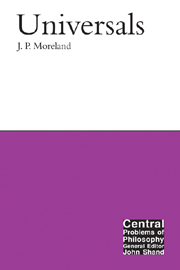Book contents
- Frontmatter
- Contents
- Preface and acknowledgements
- 1 The problem(s) of universals
- 2 Extreme nominalism and properties
- 3 Moderate nominalism and properties
- 4 Minimalist realism: Wolterstorff's kinds and Armstrong's properties
- 5 Traditional realism: properties are abstract objects
- 6 Traditional realism: issues and objections
- 7 The individuation of particulars
- Notes
- Bibliography
- Index
1 - The problem(s) of universals
- Frontmatter
- Contents
- Preface and acknowledgements
- 1 The problem(s) of universals
- 2 Extreme nominalism and properties
- 3 Moderate nominalism and properties
- 4 Minimalist realism: Wolterstorff's kinds and Armstrong's properties
- 5 Traditional realism: properties are abstract objects
- 6 Traditional realism: issues and objections
- 7 The individuation of particulars
- Notes
- Bibliography
- Index
Summary
Along with the metaphysics of substance, the problem of universals is the paradigm case of a perennial issue in the history of philosophy. The problem of universals is actually a set of related issues involving the ontological status of properties. Prima facie, it would seem that properties exist. Indeed, one of the most obvious facts about the world is that it consists of individual things that have properties and that stand in relations to other things. It would also seem that several objects can have the same property; for example, several things can possess the same shade of red. But both the existence and nature of properties have long been a matter of dispute and the problem of universals is the name for the issues central to this debate.
Those who accept the existence of universals have appealed to a number of phenomena to make their case (e.g. the meaningfulness of language, the lawlike nature of causation, the inter-subjectivity of thinking, our ability to classify and recognize new entities, gradation and the need for perfect standards or ideal paradigms). However, historically, the problem of universals has been mainly about the “One and Many” (a.k.a. “One over Many”, “One in Many”), which involves giving an account of the unity of natural classes. To illustrate, consider the following words: RED, RED, BLUE. How many words are in the sequence? Two answers seem possible: either two or three words.
- Type
- Chapter
- Information
- Universals , pp. 1 - 22Publisher: Acumen PublishingPrint publication year: 2001



